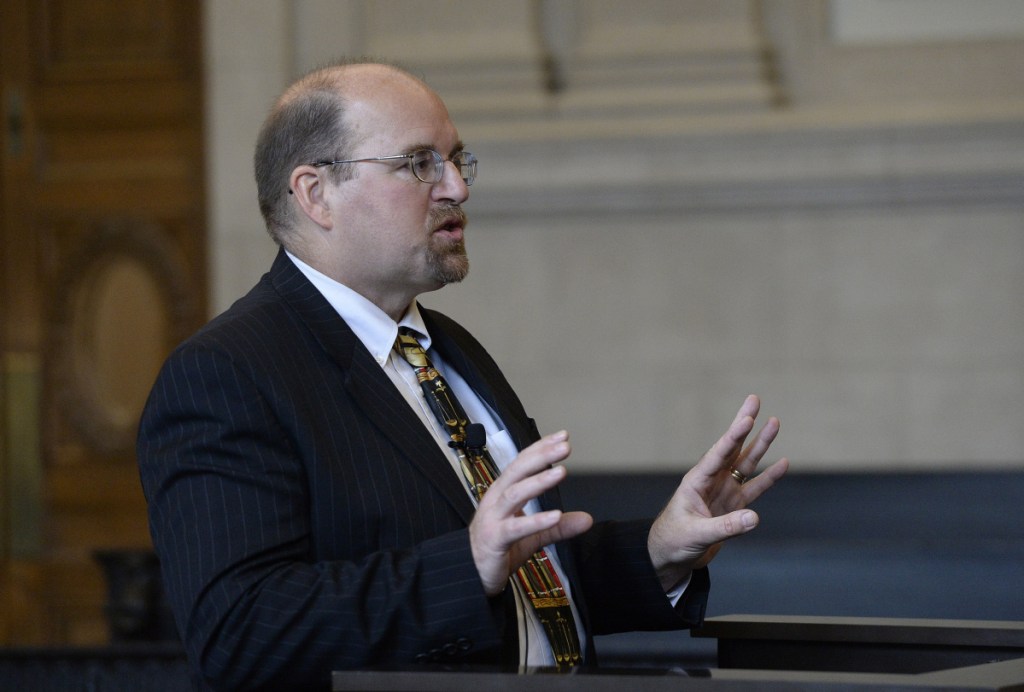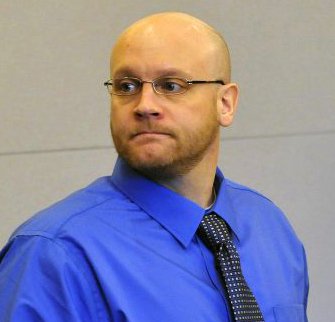A convicted killer who led police on the longest manhunt in state history says he did not get a fair trial for the shooting death of his former girlfriend.
A jury found Robert Burton guilty last year of murdering 37-year-old Stephanie Gebo in 2015 inside her home in Parkman, a small town in Piscataquis County, roughly 20 miles north of Skowhegan. He was later sentenced to 55 years in prison. He has appealed his conviction to the Maine Supreme Judicial Court, arguing the trial court erred in ways that might have prejudiced the jury against him.
During oral arguments Wednesday at the Cumberland County Courthouse, Burton’s attorney Jeremy Pratt said the defense was not allowed to pose certain questions to potential jurors that would have sussed out their biases against Burton. He also argued the court wrongly allowed information about Burton’s prior convictions for burglary and theft to be presented at trial.
“From a defense standpoint, I want a fair jury,” Pratt said. “I want an impartial jury, and I want the best possible jurors.”
The state argued that it did exclude some of Burton’s prior convictions from the trial because they were too similar to the case at hand – a conviction for criminal threatening with a dangerous weapon, for example. Prosecutors also said the defense had ample opportunity to shape the jury.
“There’s no evidence that any of the jurors that sat this case were in any way partial or not fair,” Assistant Attorney General Donald Macomber said.
Burton, 41, was not present for the oral arguments.
The night she died, Gebo was sleeping with a gun under her pillow because she feared what her jealous ex-boyfriend might do. Burton climbed through her bedroom window, armed with a knife and black duct tape. Gebo pulled the gun from under her pillow and shot him.
Bleeding from the neck and shoulder, Burton took the gun and turned it on her, shooting her from behind. He left her for dead with three bullet wounds in her back and went on the run. He had a prior domestic violence conviction that sent him to prison for a decade, and his probation for that crime had ended the day before Gebo’s murder.
Burton finally turned himself in to police 68 days later. The trial was moved from Dover-Foxcroft in Piscataquis County to Bangor in Penobscot County because of concerns about the publicity the case had already received. Burton argued that he was acting in self-defense and didn’t mean to kill his ex-girlfriend. Now 41, Burton would be in his 80s when he is eligible to be released for prison “good time.”
On Wednesday, the justices appeared to focus less on the argument about Burton’s prior convictions.
“We do not want jurors assuming that because there has been a prior crime committed, the crime charged here was definitely committed,” Chief Justice Leigh Saufley said to Burton’s attorney. “But we do want to give information about the individual’s moral compass. Will this person lie? Is this person credible?”
They spent more time asking about the process of jury selection, discussing how and when to question the jurors. Burton’s defense team had submitted questions that were later not included on the questionnaire, including one about whether a potential juror believes a person is likely guilty if he or she has been arrested for a crime. The attorneys also wanted jurors to be able to answer “unsure” to questions, instead of a simple “yes” or “no,” but that request was denied.
The justices on Wednesday posed questions to both sides about the difference between a written questionnaire and direct questioning of potential jurors, and how to assemble the best jury as efficiently as possible.
Pratt said he believes more questions during examination lead to a fairer jury. Macomber said defense attorneys have gained opportunities over time to shape juries, and the state should avoid extending the selection process for days or even weeks.
“Until a few years ago, most of us had a common understanding that there were shared beliefs free of racism, misogyny and hate-based systems,” Justice Ellen Gorman said to the assistant attorney general. “That does not appear to be true in the country anymore. So shouldn’t we allow defense counsel to ask more questions than they ever have before to find out what is actually going on?”
“Well, maybe,” Macomber said. “As long as it’s designed to be sure that the person’s fair and impartial. And that is exactly what is going on.”
It is not clear when the court will issue an opinion on the appeal.
Megan Doyle can be contacted at 791-6327 or at:
mdoyle@pressherald.com
Twitter: megan_e_doyle
Send questions/comments to the editors.





